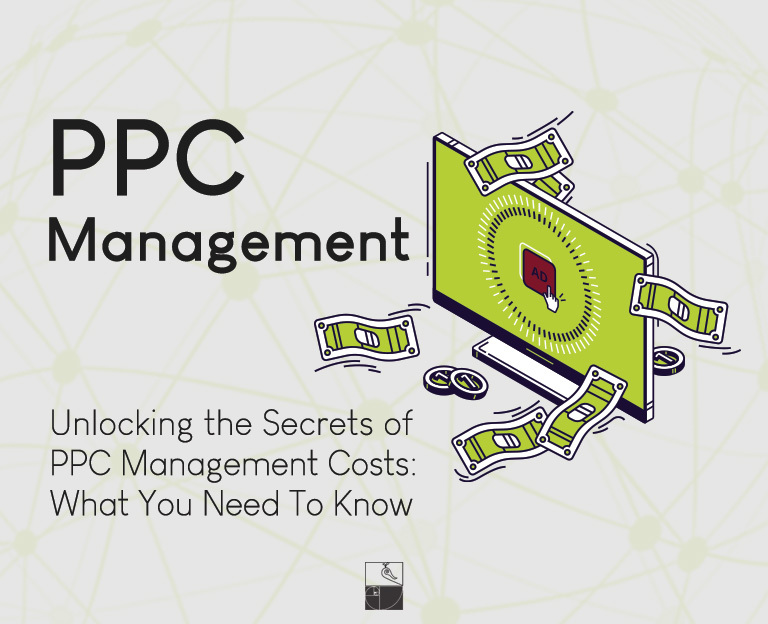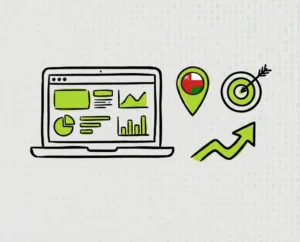Pay-Per-Click (PPC) advertising has become an indispensable tool for businesses looking to reach their target audience and drive valuable website traffic. However, one common question when delving into PPC is, “How much should PPC management cost?” The pricing structure for PPC management can vary significantly, leaving many business owners and marketers needing clarification. This article will unravel the mysteries surrounding PPC management costs, exploring the factors influencing pricing and helping you set realistic expectations for your vendor. Whether you’re considering hiring a PPC agency or consultant or want to gain a deeper understanding of the cost dynamics, join us as we dive into the world of PPC management costs and discover the secrets to making informed decisions.
The YouTube link below provides more information about PPC Management:
https://www.youtube.com/watch?v=9JUGLdLzrEk&pp=ygUTcHBjIG1hbmFnZW1lbnQgY29zdA%3D%3D
Decoding PPC Management Costs: What Factors Influence Pricing?
After a brief hiatus, we’re back with a burning question from Phil of Trumbull: “How much do companies usually charge for running a PPC campaign?” Account management fees can vary significantly, and it’s natural to seek a baseline for what to pay when hiring PPC agencies or consultants. For example, Phil wants to run a PPC campaign for his e-commerce business. He reaches out to different PPC agencies to inquire about their pricing. While some agencies provide a flat rate for their services, others offer a combination of a flat rate and a percentage of the ad spend. Phil also considers the vendors’ expertise, as some agencies may have a proven track record in his specific industry, while others may be more generalist. Additionally, Phil needs to decide whether he wants the agency to take ownership of all the tasks involved in the campaign, including creative development and technical implementation, or if he prefers to have more direct involvement in the strategy. All of these factors, including the scale of the campaign, the geographic targeting required, the competitive landscape, and the complexity of the ad copy and creative assets, will influence the pricing provided by the PPC agencies Phil consults.
Several factors come into play when determining the cost:
- Level of Experience
- Ownership of Tasks
- Single or Multiple Channels
- Strategist or Team Member
- Geographic Targeting
- Campaign Scale
- Copy & Assets
- Competitive Landscape
1)Level of Experience
The level of experience plays a crucial role in pricing a PPC vendor. Highly experienced vendors command higher fees due to their proven track record and in-depth knowledge. Their expertise stems from managing numerous campaigns across various industries, allowing them to navigate challenges, identify optimization opportunities, and develop effective strategies. These seasoned vendors deeply understand platforms like Google Ads, Microsoft Advertising, and Facebook Ads, staying up-to-date with trends, algorithm changes, and best practices. With their strategic guidance, they can optimize ad copy, landing pages, and audience targeting, leading to higher conversion rates and return on ad spend. While experienced vendors may come at a premium, their expertise can save money by maximizing campaign effectiveness.
Moreover, their industry relationships can provide additional advantages such as collaborations and exclusive advertising placements. When considering PPC management costs, balancing the benefits of working with experienced vendors against budgetary constraints and campaign objectives is crucial. Opting for a less experienced vendor based solely on cost may lead to missed opportunities and suboptimal results. Striking the right balance between experience, expertise, and cost will help you find a PPC vendor capable of driving campaign success.
2)Ownership of Tasks
When evaluating the pricing of a PPC vendor, it is essential to consider the ownership of tasks. Some vendors offer a comprehensive service where they take full responsibility for all aspects of the PPC campaign, including creative and technical tasks. These vendors handle everything from ad copy creation, keyword research, and bid management to landing page optimization and performance tracking. By entrusting them with complete ownership, businesses can save time and effort, allowing them to focus on other core activities. However, such comprehensive services often come at a higher cost due to the required expertise and resources.
On the other hand, if you prefer to retain control over certain aspects of the campaign, you can opt for a vendor specializing in specific channels or tasks. For example, you may have expertise in ad copywriting and prefer to handle that aspect in-house while outsourcing bid management or landing page design to the vendor. This approach allows for more customization and cost flexibility. The vendor’s level of involvement and the degree of task ownership will influence the overall pricing structure. It’s essential to clearly define expectations and discuss the level of control you desire to ensure a mutually beneficial partnership.
3)Single or Multiple Channels
In addition to task ownership, another factor influencing PPC management pricing is the number of channels involved in the campaign. PPC advertising can be conducted across various platforms, such as Google Ads, Microsoft Advertising, LinkedIn, Facebook, TikTok, and more. Each platform has its unique requirements, targeting options, and optimization techniques. Managing multiple channels requires more effort, expertise, and coordination to ensure consistent messaging and optimal platform performance. The complexity of handling multiple channels simultaneously can significantly impact the overall cost of PPC management. The vendor must allocate resources and dedicate specialized teams to manage campaigns across different platforms effectively. They must stay up-to-date with platform updates, algorithm changes, and best practices specific to each channel.
Furthermore, managing multiple channels involves coordinating and optimizing campaigns across different ad formats, audience targeting options, and performance metrics. These factors contribute to the increased complexity and workload, which can result in higher pricing for PPC management services. When assessing the appropriate pricing for your PPC campaign, consider the channels involved and the level of expertise required to manage them effectively. This consideration will help you determine the proper budget allocation and ensure that you receive comprehensive and effective management across all platforms.
4)Strategist or Team Member
When considering PPC management costs, it’s essential to determine the level of involvement you expect from the vendor. Some businesses prefer vendors who function as strategic partners, providing valuable insights and recommendations to optimize their PPC campaigns. These vendors typically deeply understand industry trends, audience behavior, and campaign optimization strategies. They work closely with you to develop a comprehensive PPC strategy aligned with your business goals. However, this higher level of strategic input often comes at a higher cost. Vendors serve as strategists who invest significant time and effort in analyzing data, conducting market research, and developing tailored strategies. They provide ongoing consultation and make data-driven recommendations to enhance campaign performance.
On the other hand, if you have a well-defined PPC strategy and prefer a vendor who executes specific instructions, the cost may be lower. These vendors focus on implementing the provided instructions efficiently and effectively without offering extensive strategic input. Their role is primarily execution-oriented, ensuring that campaigns are set up, monitored, and optimized according to the predetermined guidelines. Choosing between a strategist and a team member depends on your needs and resources. A team-member approach may be more cost-effective if you have the expertise to develop a solid PPC strategy in-house. However, if you seek a partner to guide your PPC efforts strategically, investing in a vendor who can serve as a strategist may yield better results, albeit at a higher cost. Ultimately, the choice depends on the level of strategic input and collaboration you require from the vendor to achieve your PPC objectives.
5)Geographic Targeting
In addition to the abovementioned factors, geographic targeting is another important consideration when determining PPC management costs. Your PPC campaign will require geographic targeting if your business operates in multiple regions or has specific target markets in different countries or cities. Targeting different regions adds complexity to the campaign as it involves understanding local markets, languages, cultural nuances, and competition. Effective geographic targeting requires in-depth research, localized ad creation, keyword selection, and optimization specific to each region. The vendor needs to have a deep understanding of the target regions and the ability to tailor the campaign to resonate with the local audience. This level of expertise and effort often comes with additional costs. The complexity and reach of a geographically targeted campaign may require the vendor to allocate more resources, invest in specialized tools, and dedicate more time to manage and optimize the campaign effectively. Therefore, it’s essential to consider the extent of geographic targeting required for your PPC campaign and discuss it with the vendor to understand how it may impact the overall cost. By factoring in geographic targeting, you can ensure that the pricing accurately reflects the effort and expertise needed to successfully execute a targeted PPC campaign across different regions.
6)Campaign Scale
Another critical factor to consider when determining PPC management costs is the scale of your campaign. The size and scope of your PPC campaign can directly impact pricing. Larger campaigns that involve multiple ad groups, extensive keyword research, and ongoing optimization efforts require more time, resources, and expertise from the vendor. Managing a large-scale campaign involves handling a larger volume of data, setting up and monitoring numerous ad groups, conducting thorough keyword research, and continuously optimizing the campaign to drive results. The vendor may need to allocate an additional workforce, utilize advanced campaign management tools, and implement more sophisticated strategies to handle the complexity and scale of the campaign effectively. These additional resources and efforts contribute to higher management costs.
On the other hand, smaller campaigns with fewer ad groups and more superficial structures may require less time and resources, resulting in lower management costs. Therefore, it’s essential to assess the scale and complexity of your PPC campaign when discussing pricing with the vendor. By considering the campaign scale, you can ensure that the pricing accurately reflects the effort and resources needed to manage and optimize your PPC campaign effectively, regardless of size.
7)Copy & Assets
In addition to the abovementioned factors, another important consideration when determining PPC management costs is developing and optimizing ad copy and creative assets. Crafting compelling ad copy and visually appealing creatives is essential for driving engagement and conversions in PPC campaigns. It may incur additional costs if you expect your vendor to take responsibility for developing, testing, and optimizing these elements. Customized designs, extensive A/B testing, and ongoing refinement of ad copy can require specialized skills, time, and resources from the vendor. The cost may vary depending on the complexity of the creative assets, the number of iterations needed, and the level of customization required to align with your brand identity and campaign objectives.
Additionally, requiring the vendor to handle tasks such as landing page design or multimedia content creation can further contribute to the overall management costs. By investing in professional ad copy and creative assets, you can enhance the effectiveness of your PPC campaigns. However, it’s essential to discuss the scope of work related to ad copy and creative development with your vendor and consider the associated costs to ensure that your budget aligns with your expectations for quality and customization.
8)Competitive Landscape
The competitiveness of your industry or niche is a crucial factor in determining PPC management costs. In highly competitive sectors, where multiple businesses target the same audience, achieving success in PPC advertising becomes more challenging. It requires sophisticated strategies, continuous monitoring, and adjustments to stay ahead of competitors. These additional efforts and expertise contribute to higher pricing for PPC management services. Vendors must invest extra time and resources in comprehensive keyword research, advanced bidding strategies, ad testing, and competitor activity monitoring. Selecting a PPC vendor experienced in your industry’s competitive landscape is essential for developing effective strategies. Although managing campaigns in competitive industries may incur higher costs, the potential returns on investment can be significant. By discussing industry competitiveness with potential vendors and assessing their capabilities, you can position your PPC campaigns strategically to outperform competitors and achieve a strong ROI.

How Do PPC Vendors Typically Structure Their Charges?
Engaging a PPC vendor for platforms like Google, Microsoft, LinkedIn, Facebook, TikTok, or others means entrusting them with technical tasks and strategic planning that you may need more time or expertise. When evaluating the cost of a vendor, consider how much it would cost if you were to undertake the same work. Calculate the hours required for these tasks multiplied by your hourly salary. For example, let’s consider a business owner named Sarah who wants to run a PPC campaign on various platforms to increase her online sales. Sarah decides to approach different PPC vendors to understand their pricing structures. As she evaluates the costs, she considers the time and expertise required to manage the campaign herself. She calculates the hours she would need on tasks like keyword research, campaign setup, ad creation, and ongoing optimization, multiplying it by her hourly salary. After comparing this self-management cost with the pricing offered by PPC vendors, Sarah realizes that outsourcing the work to a vendor is more cost-effective for her business. This example highlights the importance of considering the financial value of your time and expertise when evaluating the cost of hiring a PPC vendor.
Hiring an agency or vendor often proves more cost-effective than handling everything internally. Let’s explore common payment structures:
1)Flat + Percentage
One typical fee structure in PPC management combines a flat rate and a percentage of the managed spend. This widely adopted approach balances a fixed fee and a variable component tied to the advertising investment. The flat rate covers the agency’s overhead expenses and is a base fee for their services. It typically falls within the range of $500 to $2,500 per month. The percentage of spend, on the other hand, can vary based on the advertising investment.
In some cases, it remains fixed, while in others, it may be scaled based on the spending level. The percentage typically ranges from 5% to 13% of the managed ad spend. The variable fee component can reach several thousand dollars for campaigns with higher ad spending. This fee structure allows agencies to ensure their costs are covered and generate a profit while providing clients with transparency and scalability based on their advertising investment.
2)Flat Rate
Another pricing structure in PPC management is a flat-rate fee, which provides stability and predictability for clients. With this approach, vendors charge a fixed monthly fee for their services. The flat rate may or may not include the ad spend costs, depending on the vendor’s pricing model. Typically, flat rate fees range from $2,500 to $10,000 per month. However, it’s important to note that the specific fee can vary based on various factors. Additional tasks beyond essential account management, such as designing ads and landing pages, setting up technical conversion tracking, or managing scope creep, may influence the fee. The flat rate may increase if the vendor is responsible for these extra responsibilities. Conversely, if the client handles some of these tasks internally, it could result in a lower flat rate fee. Ultimately, the flat rate structure provides clients with transparency and a fixed cost for PPC management services, while the actual fee may be adjusted based on the specific requirements and scope of work involved.
3)Performance-Based
In addition to the fee structures mentioned earlier, some agencies and vendors offer a pay-per-lead structure in PPC management. This pricing model links the payment to the actual results achieved, typically measured in terms of leads generated. Under this arrangement, the vendor charges a fee for each lead acquired through the PPC campaign. While this approach may initially appear attractive, it’s essential to consider specific implications. With a pay-per-lead structure, the vendor retains ownership of the PPC account, which means they control the campaign settings, data, and optimizations. This setup can be suitable for businesses with no intention or capacity to manage PPC internally, as it offloads the responsibility to the vendor. However, an account ownership model is recommended if you prioritize complete control over your PPC account and require visibility into the work being done. With an account that you own, you can oversee and access all aspects of the campaign, maintain control over the data, and make informed decisions based on your specific business goals and strategies.
Choosing the Right PPC Vendor for Your Needs
When selecting a PPC vendor, it’s vital to consider more than just your budget. Other factors influence pricing and suitability. For budgets under $2,500, managing campaigns in-house or exploring software solutions might be more cost-effective. If your ad spend fluctuates due to seasonality, flat-rate pricing provides stability. Accounts with consistent spending patterns benefit from percentage-of-spend structures and discounted fees.
Additionally, choose between expertise and direct involvement. Higher-priced vendors offer strategists who handle tasks without constant guidance. Cheaper options may require more explicit instructions and more involvement in the strategy. By evaluating these factors, you can navigate the complex landscape of PPC management costs, find the right vendor, and make informed decisions aligned with your needs.
1)Budget
In addition to the fee structures mentioned earlier, some agencies and vendors offer a pay-per-lead structure in PPC management. This pricing model links the payment to the actual results achieved, typically measured in terms of leads generated. Under this arrangement, the vendor charges a fee for each lead acquired through the PPC campaign. While this approach may initially appear attractive, it’s essential to consider specific implications. With a pay-per-lead structure, the vendor retains ownership of the PPC account, which means they control the campaign settings, data, and optimizations. This setup can be suitable for businesses with no intention or capacity to manage PPC internally, as it offloads the responsibility to the vendor. However, an account ownership model is recommended if you prioritize complete control over your PPC account and require visibility into the work. With an account that you own, you can oversee and access all aspects of the campaign, maintain control over the data, and make informed decisions based on your specific business goals and strategies.
2)Spend Volatility
When considering PPC management costs, it’s essential to consider the volatility of your ad spend. If your advertising budget fluctuates significantly due to seasonal factors or promotional campaigns, opting for a flat-rate pricing structure may offer greater predictability and stability. With a flat-rate fee, you pay a fixed amount each month, regardless of the variations in your ad spend. This payment can be beneficial when you prefer a consistent budget allocation for your PPC efforts, allowing you to plan your expenses more effectively. By choosing a flat-rate pricing model, you can avoid unexpected cost fluctuations and ensure that your PPC management expenses remain within your predetermined budget. However, your ad spending remains relatively stable throughout the year. In that case, a percentage-of-spend pricing structure may still be viable, as it directly ties the management fee to the amount you invest in advertising. Evaluating the volatility of your ad spend and considering your budgeting preferences will help you determine the most suitable pricing structure that aligns with your business goals and financial stability.
3)Stability of Spend
Regarding PPC management costs, the stability of your ad spend can impact the pricing structure that works best for your business. If your advertising budget remains relatively consistent and predictable, opting for a percentage-of-spend pricing structure can offer several advantages. This model calculates the management fee as a percentage of your ad spend. Accounts with stable spending patterns often benefit from discounted fees, as vendors can predict their workload and allocate resources accordingly. This spending can be more cost-effective as the management fee scales proportionally with your advertising investment. You pay proportionately for the work required to manage your campaigns by aligning the management costs with your spending. It also provides transparency, as the fees are directly tied to the tangible value generated through your advertising efforts. However, a flat-rate pricing structure might be more suitable to maintain budget stability if your ad spend is highly volatile or subject to frequent fluctuations. Assessing the stability of your spending and understanding how it aligns with your overall marketing strategy will help you determine the most appropriate pricing structure for your PPC management needs.
4)Expertise vs. Involvement
The level of expertise and direct involvement are important factors when considering PPC management costs. Higher-priced vendors offer experienced strategists who can handle the campaign without constant guidance, providing valuable insights and freeing up time for other business tasks. However, this level of expertise often comes at a higher cost. On the other hand, more affordable vendors may require more explicit instructions and greater involvement in strategy development and execution. While they may offer different levels of strategic guidance, they can execute specific tasks efficiently. Choosing between expertise and direct involvement depends on your budget, preferences, and available resources. If you have the budget and prefer to rely on professionals for strategic aspects, investing in a higher-priced vendor may be the best choice. Alternatively, if budget constraints are a concern and you are willing to invest time and effort, opting for a more affordable vendor that executes specific instructions can be a viable option. Assess your expertise, availability, and desired involvement to make an informed decision aligned with your goals and budget.
Key Takeaways
There is no fixed rate for PPC management. The cost depends on the level of support and expertise required. When determining the appropriate pricing, consider the factors mentioned above. Set realistic expectations for your vendor and the campaigns they will create and manage. You can find a PPC management solution that aligns with your needs and budget by striking the right balance between cost and value.
1)Variable Pricing
The cost of PPC management services is flexible and can vary depending on various factors. It’s important to understand that PPC management has no one-size-fits-all pricing structure. The costs are determined based on the support and expertise required to achieve your campaign goals. Factors such as the complexity of your campaign, the size of your advertising budget, the competitiveness of your industry, and the scope of work involved all contribute to the variability in pricing. For example, if you have a highly competitive industry, you may need more advanced strategies and ongoing monitoring, which can increase the cost of PPC management.
On the other hand, if you have a smaller budget and a less complex campaign, the pricing may be more affordable. It’s crucial to have open and transparent discussions with potential PPC vendors to understand how they calculate their pricing and ensure that your expectations align with their services. By setting realistic expectations and considering the variables that influence pricing, you can make informed decisions and find a PPC management solution that fits your needs and budget.
2)Pricing Factors
When considering the pricing for PPC management, several factors come into play. The vendor’s experience level is essential, as highly experienced vendors may charge more due to their proven track record and expertise. The ownership of tasks is also a factor, with vendors handling both creative and technical tasks or taking ownership of specific channels likely to have higher costs. Managing multiple channels can increase the complexity and cost of PPC management. It also influences the cost if you desire strategic input from the vendor or want them to be part of your team. Geographic targeting, especially targeting multiple regions, may require additional resources and expertise, leading to higher costs. The scale of your campaign, the development and optimization of ad copy and creative assets, and the competitiveness of your industry are all factors that can impact pricing. By considering these factors and discussing them with PPC vendors, you can better understand the cost structure and ensure that the services provided align with your needs and budget.
3)Realistic Expectations
When entering into a partnership with a PPC management vendor, it’s essential to establish realistic expectations. Recognize and appreciate the value that the vendor brings to the table and align it with your budget and campaign goals. Communicate your expectations to the vendor, ensuring they understand your objectives and desired outcomes. It’s essential to consider the cost of the PPC management services about the value they provide. While seeking cost-effective solutions is natural, remember that the lowest price doesn’t always guarantee the best results. Striking the right balance between cost and value will enable you to find a PPC management solution that meets your needs and fits within your budget. Additionally, maintain open and transparent communication with the vendor throughout the partnership, providing feedback and addressing any concerns promptly. This collaborative approach will help ensure a successful working relationship and optimize the performance of your PPC campaigns.
Conclusion
In conclusion, understanding the intricacies of PPC management costs is essential for businesses seeking to maximize their advertising investments. By considering factors such as the vendor’s experience, task ownership, channel complexity, and level of strategic involvement, you can make informed decisions when selecting a PPC vendor. Evaluating different payment structures, such as flat rates, percentage-of-spend models, or performance-based arrangements, allows you to find the most suitable pricing option for your budget and goals. Remember to assess your budget, spending volatility, stability of spend, and desired level of vendor involvement to determine the optimal approach. While there is no fixed rate for PPC management, by setting realistic expectations and finding the right balance between cost and value, you can unlock the full potential of your PPC campaigns and drive meaningful results for your business.




